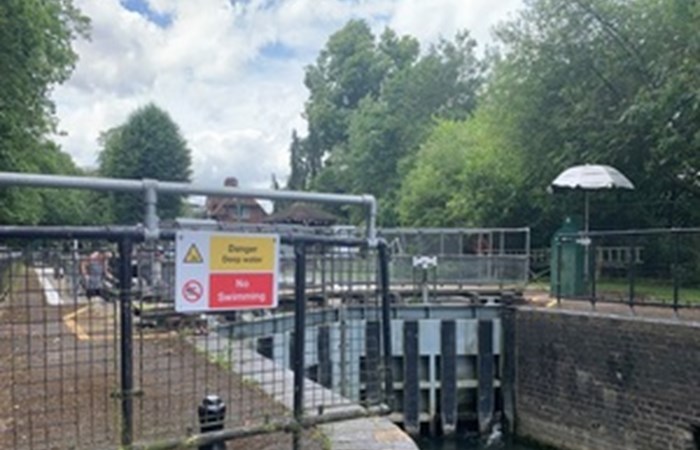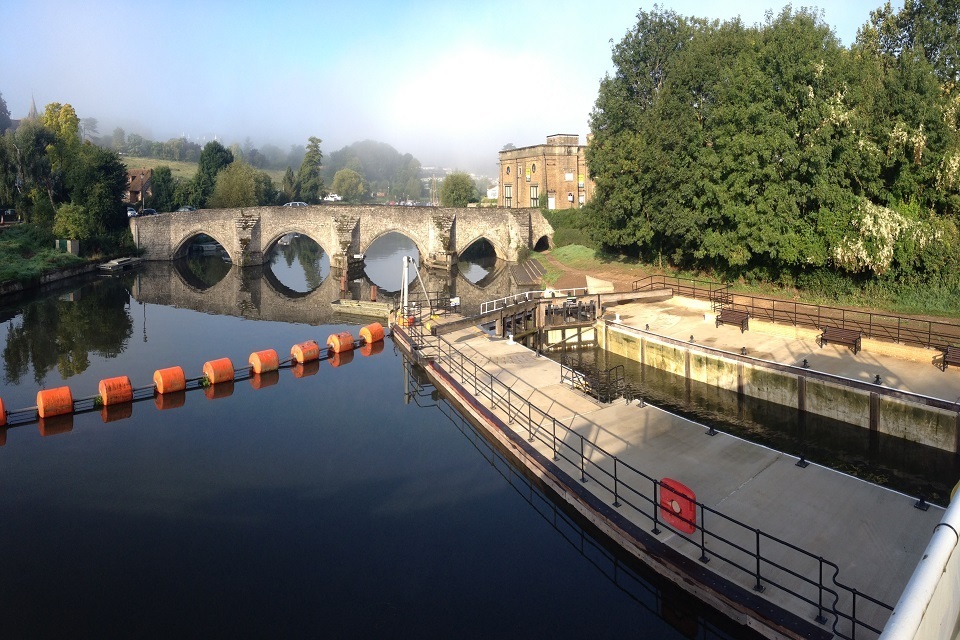Environment Agency

The summer holidays are fast approaching, and after the hottest June on record, many school and college pupils will be looking forward to long, sun-filled afternoons.
Some might feel that the best way to cool off is to get together and take a plunge in the River Medway. However, this can be unsafe and, in the past, has led to tragedy.
Waterways contain hazards, particularly in and around structures, such as bridges, locks, weirs and flood channels. Weirs, in particular, have circular currents that can drag people under water and prevent escape. The heavy rain and thunderstorms we have experienced also increase flows, with cold water and strong currents likely to catch bathers in open water off-guard.

Don't be fooled by the warm surface of the water - cold water shock can kill
Russell Robson, a team leader for the Environment Agency, said:
Weve had great weather in June, but whenever the sun comes out and temperatures warm up, some young people are taking careless risks. Our lock sites and weirs can be especially dangerous with young people jumping in from steep-sided walls into what might be quite shallow water. Even if the water is deeper, its often hard to tell what hazards lie on the riverbed. The message is simple stay clear of the water near locks and weirs, and always pay attention to warning signage - its there to keep you safe.
Of course we want everyone to enjoy the river and all that is going on around it, but were asking people to have some common sense as well. This year, we particularly want to get the message out to parents and ask them if they know where their children are going on a hot summer afternoon. Do they think they might be using the river? If so, we would encourage parents, carers and guardians to share our water safety advice with their children.
Leanne McMahon, area manager for customer safety at Kent Fire and Rescue Service (KFRS) said:
We want people to enjoy the summer months, but to do so safely and responsibly. Water can be a lot colder than it looks, which could cause you to go into cold water shock and put you at greater risk of drowning.
Its much safer to use designated swimming areas, or somewhere where theres a lifeguard. Remember, if you see someone struggling in water, call 999 and ask for the fire service if its inland, such as lakes or rivers, or ask for the coastguard if its coastal.
Key safety points
- If you find yourself in trouble, try not to panic and remember Float To Live.
- Lean back in the water and spread your arms and legs to stay afloat and control your breathing. It can take up to 90 seconds for the effects of cold water shock to pass.
- When you have done so, call out for help or try and swim to safety.
- Its important people call for help rather than entering the water to attempt a rescue, as this can often result in emergency services needing to find and rescue more people from the water.
Top water safety tips
Dont jump or dive in as the depth may vary and there can be unseen hazards.
Dont go in near weirs, locks, pipes and sluices. These and some other water features are often linked with strong currents.
Inland waters can be very cold no matter how warm the weather. Those going into cold water can get cramp and experience breathing difficulties very quickly.
Most importantly, parents and guardians can help keep children in their care safe by:
- Teaching them to swim
- Warning them not to go into water alone, or unsupervised
- Ensuring they know where the children are and what they are doing
- Supervising them closely when near any open water
Drowning can occur very quickly even in shallow water and the key to keeping safe is to take all necessary precautions to avoid getting into difficulty in the first place.
- There were 226 accidental fatalities in the UK in 2022; 105 of them during June, July and August.
- Of those 226, 151 of them were in England; 45 in Scotland; 22 in Wales; 8 in Northern Ireland.
- Inland water, such as rivers, canals, lakes, reservoirs, and quarries continue to be the leading locations for accidental drowning with 60 per cent of deaths.
- Males continue to over-represent, with 83 per cent of accidental fatalities.
- Recreational activities accounted for 58 per cent of accidental fatalities.
-
According to the Royal Life Saving Society (RLSS), around 25 per cent of primary pupils leave school unable to swim, and experts fear that as a result of the pandemic, many young people lack the ability to swim or self-rescue.
- Cold water is defined as anything below 15C. The average sea temperature around the UK and Ireland is just 12C. Inland waters, such as lakes, rivers, lochs and reservoirs can be colder - even on a scorching hot day in the summer.
Key Stats from Water Incident Database (WAID), maintained by the National Water Safety Forum.
Water safety messages are frequently issued by @EnvAgencySE across the summer using the hashtag
